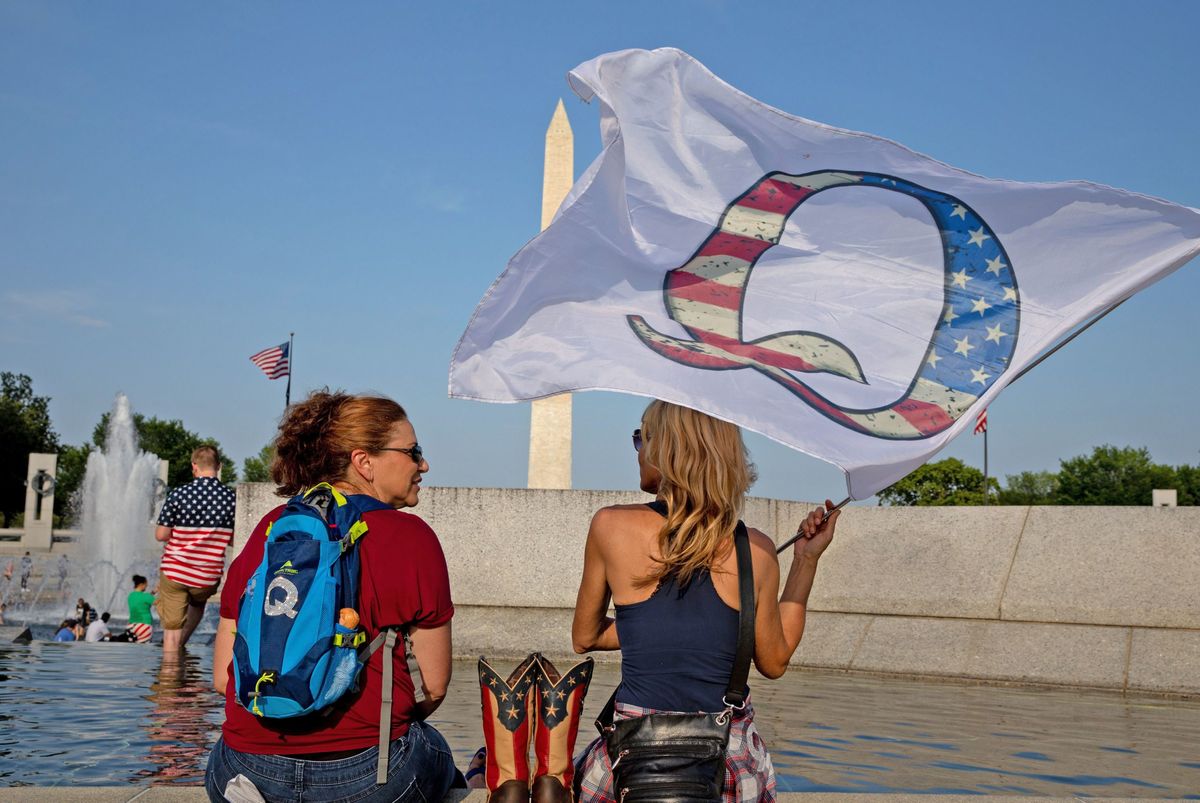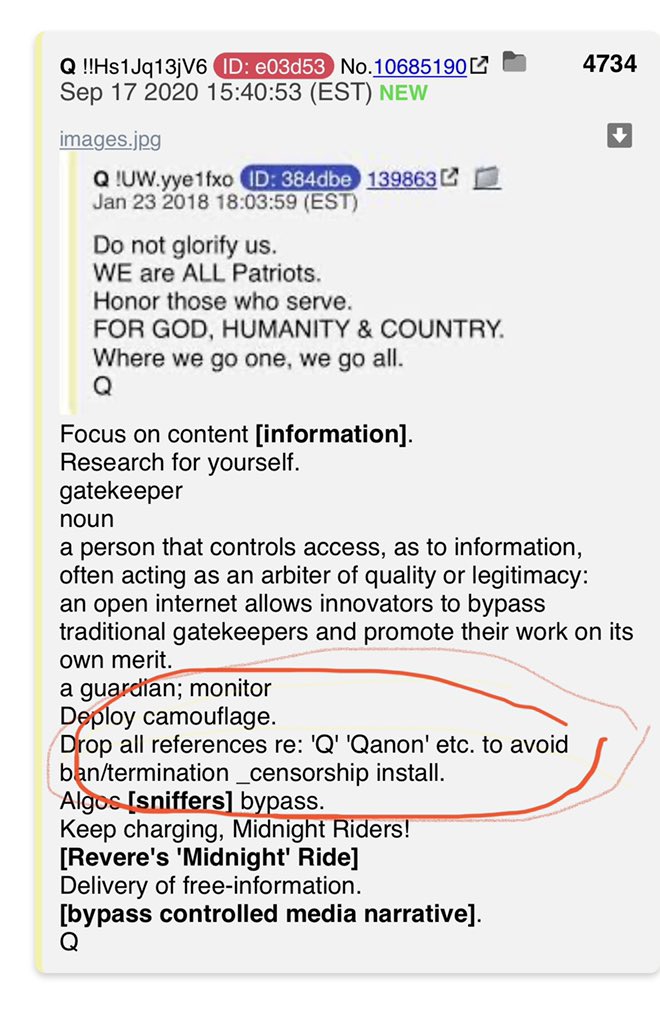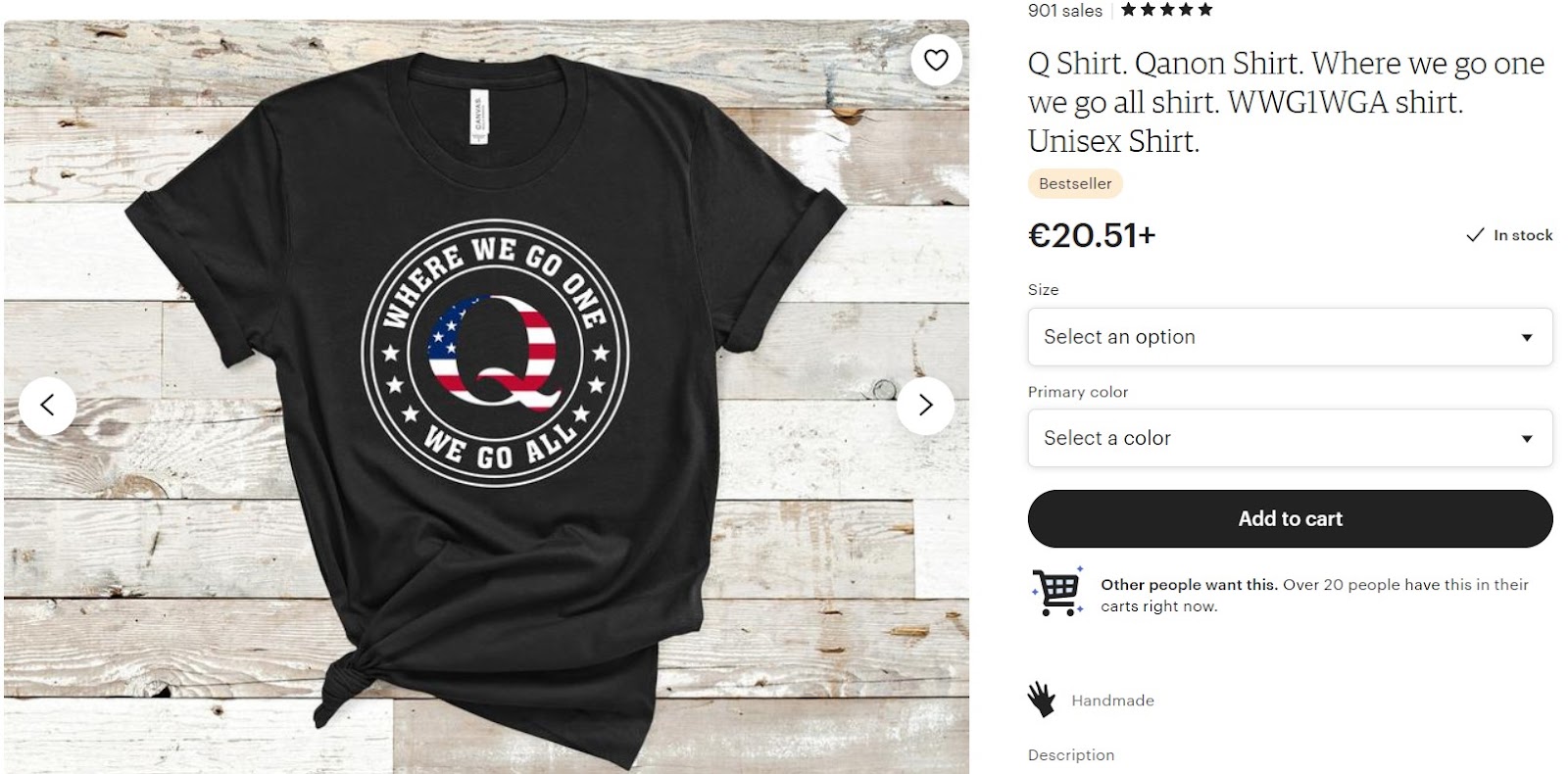As QAnon grows its influence, Q is urging followers to obscure the movement’s origins

A few minutes every morning is all you need.
Stay up to date on the world's Headlines and Human Stories. It's fun, it's factual, it's fluff-free.
In response to greater exposure, the anonymous figure known as Q has urged loyal followers to “camouflage” the movement’s origins. With the movement now gaining a footing in nonpolitical spheres, though, this appears to be an effort not to alienate potential followers.
After growing gradually since an anonymous 4chan post in late 2017, the QAnon movement has rapidly expanded its followers in 2020 due to COVID-19 conspiracy theorists and the “Save the Children” campaign.
By amplifying skepticism of the government and playing on fears of child sexual abuse, QAnon has expanded beyond its origins of being explicitly pro-President Donald Trump into an ostensibly apolitical movement. Yet, greater media attention on QAnon’s belief in a Satanic child trafficking cabal has the potential to limit the movement’s reach.
In response to greater exposure, the anonymous figure known as Q has urged loyal followers to “camouflage” the movement’s origins. The purported intention is to keep QAnon followers from being banned from social media. With the movement now gaining a footing in nonpolitical spheres, though, this also appears to be an effort not to alienate potential followers.
QAnon deploys camouflage
On September 18, Julian Feeld, who co-hosts the “QAnon Anonymous” podcast with Travis View, posted a screen capture of Q’s September 17 post, known within the movement as a Qdrop. The image included instructions for “followers to hide connections to QAnon on social media.” The Qdrop states:
“If somebody comes to accept a truth or swallow a redpill without knowing it was associated with Q, then they do so unpolluted by media bias re: “QAnon.” Bypass prejudice. Makes sense. That’s what Anon was all about, right? Nobody cares about ranks or names or upvotes or e-stardom. The content of your posts should speak for itself. Ideas.”
Feeld, who, along with View, is one of the most prolific chroniclers of the QAnon movement, further noted that one of the biggest Twitter promoters of QAnon, GitmoAwaits, had also instructed his followers to say “Goodbye Q.” That account has since been suspended as Twitter (and other social media platforms) cracks down on the spread of the conspiracy theories across its platform.
A tweet from an anonymous account, luvmestina (now suspended), urges Q followers to “camouflage” themselves, because “its [sic] battle time.” The tweet includes an image of another September 17 Qdrop in which one portion of the text is circled in red: “Deploy camouflage,” Q instructs. “Drop all references re: ‘Q’ ‘Qanon’ etc. to avoid ban/termination.”

QAnon finds QAmoms
Q claims Trump is currently working to unearth and arrest a cabal of child sex traffickers that includes celebrities like Tom Hanks and Chrissy Teigen. The conspiracy theory further alleges the cabal worships Satan and also eats the children.
One of the main ways QAnon has spread beyond the darker recesses of the conspiracy-filled internet is by co-opting the #SavetheChildren hashtag.
The hashtag was created to bring attention to the plight of endangered children around the world. Adherents of QAnon took advantage of the campaign and, in addition to other QAnon hashtags such as #WWG1WGA (short for “Where We Go One, We Go All”) and #TheStorm, used #SavetheChildren to connect with other like-minded social media users.
This social media proliferation led to a phenomenon Rolling Stone recently titled, “The Birth of QAmom”:
“The #SaveTheChildren hashtag, and numerous #SaveTheChildren marches across the country, have played an outsized role in bringing lifestyle influencers in general into the conspiracy theorist fold, but particularly moms, many of whom are drawn to the child redemption narrative inherent in QAnon ideology.”
Some of these influencer moms are explicitly sharing QAnon content, while others are inadvertently spreading the conspiracy theory by sharing content they believe is drawing attention to an important cause. QAnon has spread beyond Twitter and Facebook to seemingly apolitical sites like Etsy.com where Q-branded shirts and hats have proliferated.

Rolling Stone reports that these influencers are helping to “sanitize” QAnon. They are both normalizing a dangerously unhinged conspiracy theory and obscuring the darker edges of a movement that has called for the deaths of its political enemies.
These aspects of QAnon, as well as its worship of Trump, might normally be unsavory to many influencers. By obscuring QAnon’s role in creating and spreading these conspiracy theories, it allows the underlying beliefs to gain traction with a wider audience.
QAnon in Spanish and French
The QAnon movement began as an American conspiracy theory rooted in the belief that Trump was in an ongoing battle against a nefarious “Deep State” within the United States government. However, just as the movement has found inroads with social media influencers, it is also making efforts to cross language barriers.
Jeff Yates, a Canadian journalist in predominantly French-speaking Montreal, Quebec, tweeted on September 18 that Radio-Quebec, a far-right YouTuber whose real name is Alexis Cossette-Trudel, removed all his videos related to QAnon at “the request of Q.” Trudel’s YouTube channel, which has over 100,000 subscribers, includes multiple videos espousing COVID-19 conspiracy theories.
There is also a campaign by QAnon followers to reach Spanish-speaking people, particularly in Florida, where Trump is currently in a close race with Democratic presidential nominee Joe Biden. Numerous Spanish-language videos, memes and Facebook groups have been created in recent months to spread false conspiracy theories, some of them QAnon-related, to sway Latino voters to Trump.
Buying into QAnon
This effort to obscure the QAnon movement by Q (believed by some to be Jim Watkins, a US Army veteran currently living in Malaysia) comes at a time when just shy of 50% of the country says it has heard of the movement.
That is according to recent Pew Research Center polling that also found, unsurprisingly, a stark political divide in how Americans view QAnon. Among Republicans, 41% think QAnon is either somewhat or very good for the country, whereas only 7% of Democrats think it is a good movement.
That 7% of Democratic voters think a vehemently pro-Trump conspiracy theory could be good for the country may suggest QAnon’s hijacking of the #SavetheChildren is helping it “sanitize” its image.
Have a tip or story? Get in touch with our reporters at tips@themilsource.com




Comments ()